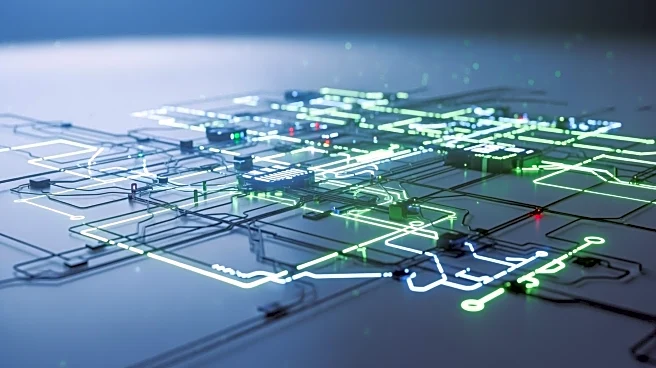What's Happening?
The rapid growth of artificial intelligence (AI) is significantly impacting the U.S. energy grid, as the demand for electricity by AI data centers surges. Historically, large data centers required around 30 MW of power, but modern hyperscale facilities
now demand between 100 to 200 MW, with some designed to consume up to several gigawatts. This increase in energy consumption is driven by the need for more computing power to support AI advancements. The Electric Power Research Institute (EPRI) projects that U.S. data center electricity demand could grow annually by 3.7% to 15% until 2030. This growth presents challenges for utilities, regulators, and policymakers in ensuring reliable and affordable electricity supply.
Why It's Important?
The increasing energy demands of AI data centers have significant implications for the U.S. energy sector. As these facilities require more power, there is a pressing need to upgrade the grid infrastructure to accommodate this growth. This includes investing in advanced transmission conductors, grid-enhancing technologies, and modern switchgear. The evolving energy markets are also adapting to balance load and supply, which is crucial for maintaining cost efficiency. The expansion of AI data centers could strain local communities if not managed properly, highlighting the importance of fair cost distribution and infrastructure investment. The U.S. must address these challenges to maintain its technological leadership and ensure energy security.
What's Next?
To address the growing energy demands, the U.S. energy grid will need significant upgrades. This includes implementing AI-driven grid applications for predictive planning and efficiency gains, as well as developing on-site or nearby generation options like hybrid renewable plants and small modular nuclear reactors. Additionally, reforms in the interconnection process are necessary to streamline the integration of new loads onto the grid. The U.S. must also focus on securing the grid against cyber threats and espionage, given the critical nature of AI applications in defense, finance, and healthcare. Building a resilient domestic supply chain and expanding the workforce in electrical engineering and skilled trades are also essential steps.
Beyond the Headlines
The rise of AI data centers not only impacts energy consumption but also poses ethical and security challenges. Ensuring that these centers do not disproportionately affect local communities is crucial. Moreover, the reliance on foreign suppliers for grid equipment raises concerns about national security, necessitating careful scrutiny of procurement processes. The shift towards cleaner backup power options, such as natural gas plants and hybrid systems, reflects a broader move towards sustainability. The U.S. must also contend with global competition, particularly from China, in scaling AI and grid infrastructure. Continued investment in R&D and public-private partnerships will be vital in maintaining a competitive edge.















